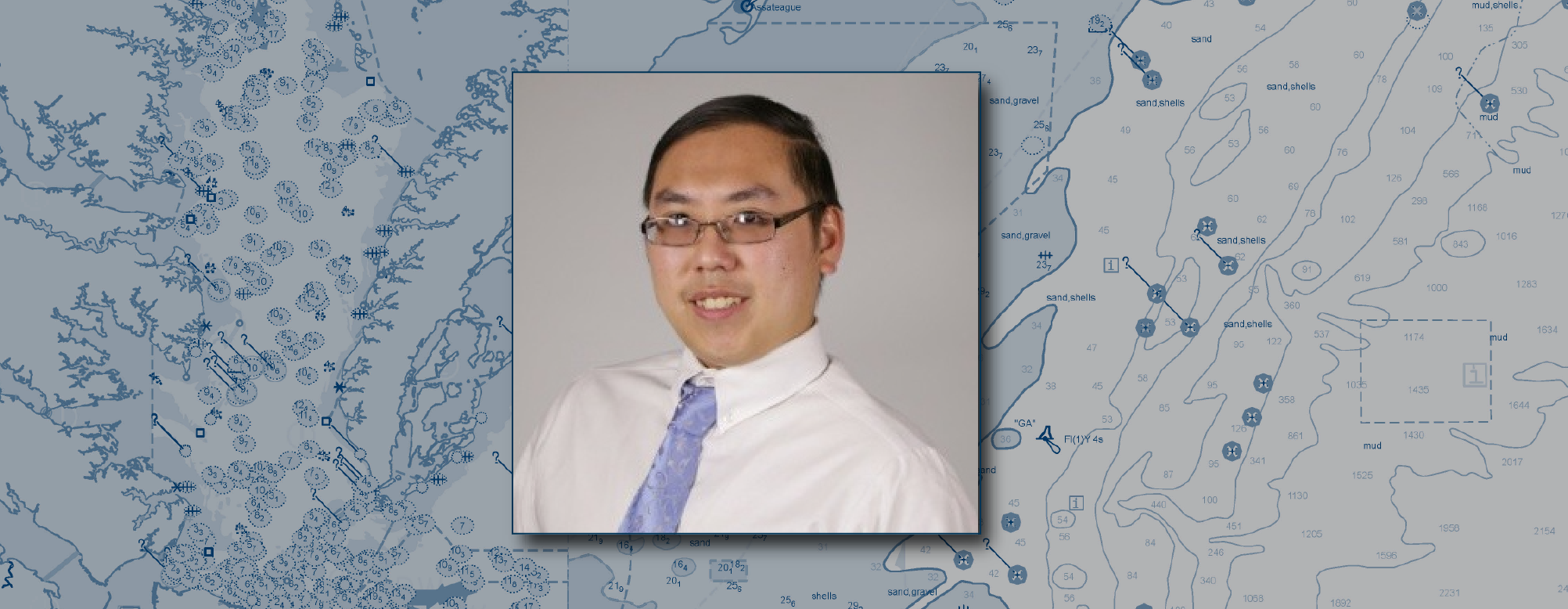Ever wonder what it’s like to be a member of the NOAA Coast Survey team? We use the Coast Survey spotlight blog series as a way to periodically share the experiences of Coast Survey employees as they discuss their work, background, and advice.
James Moy, Cartographer
“As a cartographer, I consider it a success if the updates to a chart are accurate and justified, reviewed by another with little or no revisions, and is deemed useful and safe for the public.“

What is your position at NOAA?
My current position is that of a cartographer for NOAA’s Marine Chart Division (MCD). My primary role is to update, query, and maintain a national, navigational geodatabase. One example of such a task is updating the shoreline of a specific area, and uploading the changes to the central geodatabase. This geodatabase is important for National Ocean Service nautical products and services, which are distributed for the marine public. Another role of mine is to support NOAA’s shift to prioritizing electronic navigational charts (ENCs), and its efforts to re-scheme the ENCs. To accomplish such tasks, I work with a skilled production team, while also cooperating with other various expert groups and individuals at NOAA. By working and learning with everyone, I am able to produce the best possible nautical charts and data for the public as a cartographer.
What do you find most challenging about your role?
The most challenging aspect about my role as a cartographer is that things change constantly. Whether it is the work assigned, the workflow itself, or the people we work with, there is always something new to learn at NOAA. A methodology used to update a chart may not be the same as another. For example, every geographical area is different from another due to regional nuances. New/revised policies and standards may need to be considered. New/updated technology/software may need to be introduced and adapted. All of these challenges are what make it so interesting to work at NOAA!
Do you have any tips for someone interested in the field or is a rookie at NOAA?
From my experience as both an intern, a contractor, and a federal employee, I would recommend following these tips:
- Always do your best, and try to exceed expectations.
- Always respect others, even if you do not really know them.
- Learn as much as you can from everyone.
- Ask questions. Do not be afraid/embarrassed.
- Take ‘good’ notes.
- Keep an open mind.
- Be professional.
- Mistakes will happen. Forgive yourself, and learn from them.
What college did you attend, what was your major?
I attended college at the University of Maryland College Park (UMD) with a major in geospatial information systems (GIS). I received my bachelor’s of science in GIS in 2016. Then, through the combined bachelor’s and master’s program, I acquired my master’s of science in GIS in 2017. While I was in college, I also worked as a teaching assistant for several classes, and as an intern at NOAA. Working at NOAA allowed me to not only apply the GIS knowledge I learned at UMD, it also gave me the opportunity to learn and develop new skills.
How do you define success?
Success is achieving something you want through an open mind, hard work, enhancing skills, discipline, passion, and a lot of luck. As a cartographer, I consider it a success if the updates to a chart are accurate and justified, reviewed by another with little or no revisions, and is deemed useful and safe for the public. It is even more of a success if I am able to learn from what I did.
Do you have a motto or personal montra?
My motto is: “If you always do your best, and respect others, someone will notice.”
One instance that this applied to me was when I was in college. I was attending a cartography class for a professor that I had not had before. Another student was asking the Professor a question. After the student had finished talking with the professor, I respectfully offered an additional solution to his problem. With the professor overhearing, he noticed my knowledge and professionalism, and offered me a position as his teaching assistant for the upcoming winter term. As I was still an undergraduate student, I had never taught as a teaching assistant before. However, with the professor’s support, I took on the job. By working to the best of my abilities, I went on to be a teaching assistant for several classes, and I received the Outstanding Graduate Teaching Award.

